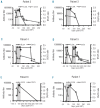Hematopoietic stem cell transplantation improves the high incidence of neutralizing allo-antibodies observed in Hurler's syndrome after pharmacological enzyme replacement therapy
- PMID: 22371174
- PMCID: PMC3436232
- DOI: 10.3324/haematol.2011.058644
Hematopoietic stem cell transplantation improves the high incidence of neutralizing allo-antibodies observed in Hurler's syndrome after pharmacological enzyme replacement therapy
Abstract
Background: Mucopolysaccharidosis type I is caused by deficiency of α-L-iduronidase. Currently available treatment options include an allogeneic hematopoietic stem cell transplant and enzyme replacement therapy. Exogenous enzyme therapy appears promising but the benefits may be attenuated, at least in some patients, by the development of an immune response to the delivered enzyme. The incidence and impact of alloimmune responses in these patients remain unknown.
Design and methods: We developed an immunoglobulin G enzyme-linked immunosorbent assay as well as in vitro catalytic enzyme inhibition and cellular uptake inhibition assays and quantified enzyme inhibition by allo-antibodies. We determined the impact of these antibodies in eight patients who received enzyme therapy before and during hematopoietic stem cell transplantation. In addition, 20 patients who had previously received an allogeneic stem cell transplant were tested to evaluate this treatment as an immune tolerance induction mechanism.
Results: High titer immune responses were seen in 87.5% (7/8) patients following exposure to α-L-iduronidase. These patients exhibited catalytic enzyme inhibition (5/8), uptake inhibition of catalytically active enzyme (6/8) or both (4/8). High antibody titers generally preceded elevation of previously described biomarkers of disease progression. The median time to development of immune tolerance was 101 days (range, 26-137) after transplantation. All 20 patients, including those with mixed chimerism (22%), tested 1 year after transplantation were tolerized despite normal enzyme levels.
Conclusions: We found a high incidence of neutralizing antibodies in patients with mucopolysaccharidosis type I treated with enzyme replacement therapy. We also found that allogeneic hematopoietic stem cell transplantation was an effective and rapid immune tolerance induction strategy.
Figures




References
-
- Barton NW, Brady RO, Dambrosia JM, Di Bisceglie AM, Doppelt SH, Hill SC, et al. Replacement therapy for inherited enzyme deficiency–macrophage-_targeted gluco-cerebrosidase for Gaucher’s disease. N Engl J Med. 1991;324(21):1464–70. - PubMed
-
- Connock M, Juarez-Garcia A, Frew E, Mans A, Dretzke J, Fry-Smith A, et al. A systematic review of the clinical effectiveness and cost-effectiveness of enzyme replacement therapies for Fabry’s disease and mucopolysaccharidosis type 1. Health Technol Assess. 2006;10(20):iii–iv. ix, 113. - PubMed
-
- Porter S. Human immune response to recombinant human proteins. J Pharm Sci. 2001;90(1):1–11. - PubMed
-
- Clarke LA, Wraith JE, Beck M, Kolodny EH, Pastores GM, Muenzer J, et al. Long-term efficacy and safety of laronidase in the treatment of mucopolysaccharidosis I. Pediatrics. 2009;123(1):229–40. - PubMed
MeSH terms
Substances
LinkOut - more resources
Full Text Sources

